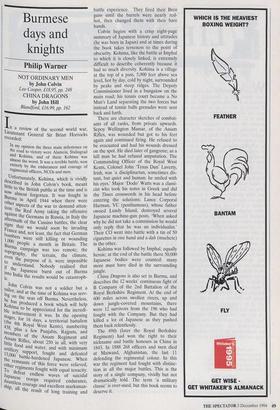Burmese days and knights
Philip Warner
NOT ORDINARY MEN by John Colvin Leo Cooper, £18.95, pp. 248 CHINA DRAGONS by John Hill Blandford, £16.99, pp. 162 I n a review of the second world war, Lieutenant General Sir Brian Horrocks recorded: In my opinion the three main milestones on the road to victory were Alamein, Stalingrad and Kohima, and of these Kohima was almost the worst. It was a terrible battle, won entirely by the endurances and courage of regimental officers, NCOs and men.
Unfortunately, Kohima, which is vividly described in John Colvin's book, meant i little to the British public at the time and s i now almost forgotten. It was fought n Burma in April 1944 when there were Other aspects of the war to demand atten- tion: the Red Army taking the offensive against the Germans in Russia, in Italy the aftermath of the Cassino battles, the clear Signs that we would soon be invading Prance and, not least, the fact that German bombers were still killing or wounding 1,000 People a month in Britain. The Burma campaign was too remote; the topography hy, the terrain, the climate, the purpose of it, were impossible to understand. Nobody realised that 5 the Japanese burst out of Burma into India the results would be catastroph- ic.
.John Colvin was not a soldier but a !a'lor, and at the time of Kohima was serv- ing on the seas off Burma. Nevertheless, ne has produced a book which will help .Kohima to be appreciated for the incredi- ble achievement it was. In the opening stages, for 16 days, a territorial battalion (the 4th Royal West Kents), numbering 438, plus a few Punjabis, Rajputs, and members of the Assam Regiment and lssaiRifles, about 250 in all, with very n ntle food and water, and with minimum artillery support, fought and defeated 1..3,000 battle-hardened Japanese. When the remnants of this force were relieved, Other regiments fought with equal tenacity. To defeat endless waves of suicidal Japanese troops required endurance, dauntless courage and excellent marksman- ship, all the result of long training and battle experience. They fired their Bren guns until the barrels were nearly red- hot, then changed them with their bare hands.
Colvin begins with a crisp eight-page summary of Japanese history and attitudes (he was born in Japan) and at times during the book takes terseness to the point of obscurity. Kohima, like the battle at Imphal to which it is closely linked, is extremely difficult to describe coherently because it had so much diversity. Kohima is a village at the top of a pass, 5,000 feet above sea level, hot by day, cold by night, surrounded by peaks and steep ridges. The Deputy Commissioner lived in a bungalow on the main road; his tennis court became a No Man's Land separating the two forces but instead of tennis balls grenades were sent back and forth.
There are character sketches of combat- ants of all ranks, from private upwards. Sepoy Wellington Massar, of the Assam Rifles, was wounded but got to his feet again and continued firing. He refused to be evacuated and had his wounds dressed on the spot. He died later of gangrene; as a hill man he had refused amputation. The Commanding Officer of the Royal West Kents, Colonel John 'Texas Dan' Laverty, Irish, was 'a disciplinarian, sometimes dis- tant, but quiet and human; he smiled with his eyes.' Major 'Dodo' Watts was a classi- cist who took his notes in Greek and did the Times crosswords in his head before entering the solutions; Lance Corporal Harman, VC (posthumous), whose father owned Lundy Island, destroyed several Japanese machine-gun posts. 'When asked why he did not take a commission he would only reply that he was an individualist.' Their CO went into battle with a tin of 50 cigarettes in one hand and a dah (machete) in the other.
Kohima was followed by Imphal, equally heroic; at the end of the battle there 50,000 Japanese bodies were counted: many more must have died in the surrounding jungle. China Dragons is also set in Burma, and describes the 12 weeks' continuous fight of B Company of the 2nd Battalion of the Royal Berkshire Regiment. At the end of 600 miles across swollen rivers, up and down jungle-covered mountains, there were 12 survivors from the 196 who had fought with the Company. But they had killed a lot of Japanese as they pushed them back relentlessly.
The 49th (later the Royal Berkshire Regiment) had won the right to their nickname and battle honours in China in 1843. In 1888 268 officers and men died at Maiwand, Afghanistan, the last 11 defending the regimental colour. In this war the regiment had fought with distinc- tion in all the major battles. This is the story of a single company, vividly but not dramatically told. The term 'a military classic' is over-used, but this book seems to deserve it.










































































 Previous page
Previous page